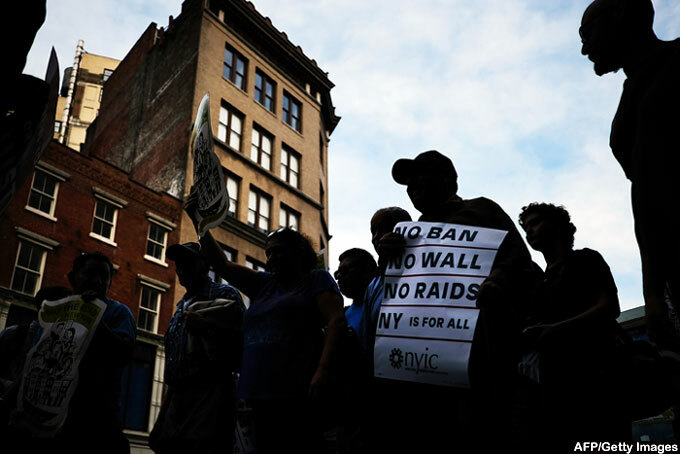US travel ban takes effect
The first hours of the new version of the ban, as allowed by the Supreme Court, appear to unfold calmly.
PIC: Travelers arrive at the international terminal at John F. Kennedy International Airport in New York City. (AFP/Getty Images)
TRAVEL
Lawyers and rights activists took up positions at major US airports as a weakened version of President Donald Trump's travel ban took effect late Thursday.
But there were no signs of the chaos that erupted when the first version of the restriction, derided as discriminatory against Muslims, was abruptly imposed back in January.
Attorneys working pro-bono set up makeshift, just-in-case legal aid stations -- some with signs in Arabic -- at airports serving New York, Los Angeles, San Francisco, Chicago, Washington and other cities, news reports said.
Protesters angry over Trump's immigration policies also turned out, with some in Los Angeles holding black-and-white placards denouncing Trump as a fascist.
But the first hours of the new version of the ban, as allowed by the Supreme Court, appeared to unfold calmly.
Gone were the dramatic scenes of some people arriving from seven mainly Muslim countries being detained and questioned for hours, with some even deported on short order to where they came from.
"We're not really expecting any issues at the airport. But we're here just in case, to monitor, to tell people what's going on, and to report back what we're seeing," Camille Mackler, director of legal initiatives at the New York Immigration Coalition, told The Daily Beast.
She was among volunteers at JFK Airport in New York awaiting flights from London, Istanbul, Doha and Abu Dhabi. "We think we're going to see it abroad, because it's really for people applying for visas," Mackler added.
The Trump administration says the temporary ban is necessary to keep terrorists out of the country, but immigrant advocates charge that it illegally singles out Muslims.
Under a Supreme Court ruling this week that allowed part of the ban to take effect -- and ended, for now, five months of skirmishes in lower courts -- the 90-day ban on visitors from Iran, Libya, Somalia, Sudan, Syria and Yemen, and a 120-day ban on refugees, will allow exceptions for people with "close family relationships" in the United States.
Activists said the government has defined that too narrowly, excluding relationships with grandparents and grandchildren, aunts and uncles and others.
The Department of Homeland Security, which was heavily criticized for mishandling many arrivals when the ban was first attempted in January, promised a smooth rollout this time. The new ban took effect at 8:00 pm Thursday Eastern time (0000 GMT Friday).
The department said that anyone with a valid visa issued before the ban began would still be admitted, and that all authorized refugees booked for travel before July 6 would also be allowed.
"We expect business as usual at the ports of entry starting at 8 pm tonight," a DHS official said. "Our people are well prepared for this."

Recent immigrants join activists for an evening protest in Manhattan hours before a revised version of President Donald Trump's travel ban that was approved by the Supreme Court is to take effect
Trump claims victory
But the ban's implementation, even with exceptions, was claimed as a political victory by Trump, after federal appeals courts twice blocked his order, saying it violated constitutional protections of religion and overshot his presidential powers.
Immigrant rights groups and Democrats in Congress continued to label Trump's order illegal and said the exemptions provided in a Supreme Court ruling on Monday remained unfair.
According to guidelines issued by the State Department, people with "close family relationships" would be exempt from the ban. It defined that to include parents, spouses, children, sons- and daughters-in-law, siblings and step- and half-siblings.
But "close family" does not include grandparents, grandchildren, aunts, uncles, nieces, nephews, cousins, brothers-in-laws and sisters-in-law, fiances and any other "extended" family members, the guidelines say.
People with formal relationships with a US entity -- who have for instance been offered a job or been accepted to study or lecture at a university -- will also qualify for visas during the ban. But a hotel reservation, even if already paid for, does not qualify.
Even as travel officials across the US made final preparations for putting the ban into place, opponents were preparing new legal challenges.
Late Thursday, Hawaii asked federal district Judge Derrick Watson to clarify the scope of the travel and refugee bans in the Pacific island state -- and to define who, specifically, the ban refers to when stating that only an immigrant's close family members can travel to the US.
"In Hawaii, 'close family' includes many of the people that the federal government decided on its own to exclude from that definition. Unfortunately, this severely limited definition may be in violation of the Supreme Court ruling," the Hawaii Attorney General Douglas Chin said in a statement.
Rama Issa, executive director of the Arab American Association of New York, said the government was redefining what a family is.
"I was raised by my grandparents, so the idea of grandparents not being part of a family is very foreign to me," Issa said at JFK, preparing to help new arrivals.
"I'm engaged to get married. I have family who lives in Syria today -- not only my father, but my aunts and uncles who I would love to be at this wedding, and unfortunately are not going to be able to be here."